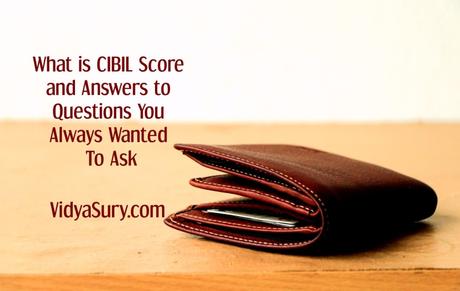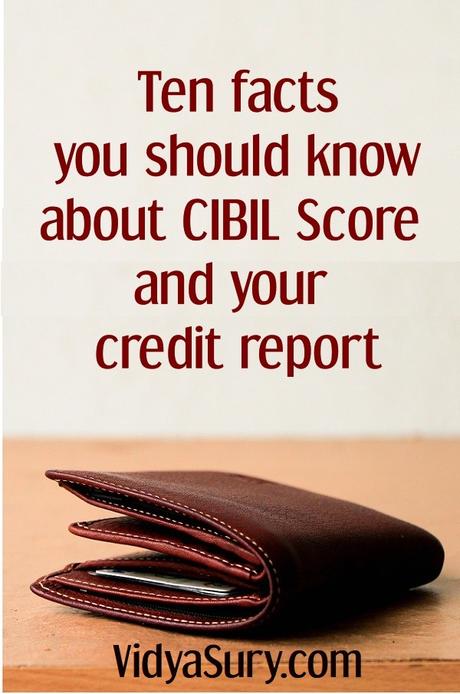
Getting to know how my finances work has been a fascinating process over the years-at least for me. I appreciate how things have changed, mostly for the better, offering the investor a variety of ways to grow those savings, I must confess there are moments when I wish I had followed through on my Associate Company Secretaryship course which I ditched after the Intermediate exams. I would have known about CIBIL score and credit reports and all the other financial stuff long before today.
During my grandma's times, of course they had a bank account, but money in the form of cash savings safely resided in a tin on the kitchen shelf. You know, for emergencies. I mean, imagine running to the bank to withdraw cash! What if you needed it when the bank was closed? ATMs were unheard of, those days. I can't blame that way of thinking as I cannot remember a single occasion when we were broke.
However.
Times have changed and technology has taken over our lives. There are good things mixed with the not so great stuff. In particular, finance management is a tricky area. Today, in a world where the consumer has a choice overload, everything is affordable, thanks to purchasing simplified with easy loans and deferred payments. With most major purchases, people prefer to take a loan or credit and of course, I'd be the first to acknowledge that credit cards are convenient.
In the meantime, I have been getting quite a few emails both from the bank and fund managers about things like CIBIL score, credit score and credit history, along with missives offering me pre-approved personal loans. Information overload, maybe, but then, you know how it is. The info keeps coming at you until you cave in and check it out. You never know when it might come in handy.
So, let me share what I've learned. I picked out some salient points because I don't want to bore you with the larger details.

Here's what you need to know, just in case you've been bombarded by emails urging you to check your credit score.
What's CIBIL score and why you must be aware of it
A CIBIL Score is a three-digit credit number generated by TransUnion CIBIL, a credit bureau based on your past credit information. This score ranges between 300 and 900. The higher your score, the easier for you to get credit from lenders. You need to know about CIBIL score if you have a credit history and also if you haven't yet applied for a credit card or loan.
Are CIBIL Score and CIBIL Rank the same?
Nope. CIBIL Score is to do with individuals and CIBIL Rank applies to organizations.
- Score ranges from 300-900. The closer the individual's score is to 900, the better her chances of getting a loan.
- Rank ranges from 1-10. The closer the company's rank is to 1, the better their chances of getting a loan from their lenders.
Does CIBIL Score have anything to do with savings or investment account info?
Nope! It has nothing to do with either. CIBIL scores are arrived at based on your credit history and ongoing credit behavior. Of course, your CIBIL CIR or credit information report may have info on your current credit accounts and related credit activities but does NOT include these: your savings/FB/trading/current/savings/investment account. These have no impact on your Score. Instead, it focuses on missed payments, charge offs, etc.
What are Charge offs?
When you owe a debt-can be credit card, mortgage or other debt-you obviously have to repay it. If you miss payments for six months, the creditor gives up on the debt and marks the debt as a charge off-basically declaring that the debt is unlikely to be collected. Doesn't mean you don't have to pay the debt-you are still legally bound to pay it. The creditor may further sell this bad debt to a collection agency or debt buy. Consequently, your debt may appear twice in your credit report-once from the original creditor and second from the debt collector who bought it. Bad news. This stays on your credit report for seven years from the date of default. Late payments and charge-offs on a credit report lead to a low credit score. You need to maintain a good credit score and fortunately there are ways to repair a bad one.
Okay, back to CIBIL scores
CIBIL Scores may be different from credit scores by other credit bureaus
Clearly that adds to the confusion. What's the logic? Every credit bureau (Equifax, Experian) has its own scoring model. Also, they may receive the updated credit info on different days.
Can information on your credit report be deleted by CIBIL?
Nope. CIBIL gets its info from various sources and is not authorized to delete or even edit your credit info. At the most they can update your credit report if the credit source authorizes these changes.
Will checking your CIBIL score often impact it?
With conventional credit scores there can be issues. However, you can check your CIBIL score as often as you want. If you do it through a credit bureau it is called a soft enquiry and has no impact on the score. There's an impact only if banks, credit card companies and other creditors make inquiries about your credit report from credit bureaus. This is called a hard enquiry.
What if you have no credit history? Will you have a great CIBIL score?
That was my question. In reality, even if you never had a credit card and never took a loan of any kind, you cannot get a CIBIL credit score. Same with other credit bureaus. Why? Because no credit data, no credit report and therefore, no credit score.
If you've never asked CIBIL for your score does that mean you don't have one?
Nope. If you have a loan in your name or are using credit cards, each month, lenders/banks report the borrower's credit info to credit bureaus. So like it or not you have a credit history and therefore a credit score.
What if you close all your credit accounts? Will it improve credit score?
Nope. The opposite, in fact. If you have long and stable credit history, it indicates that you have managed it responsibly. It makes you a better prospect for lenders. So, older your credit account, better your credit score so long as it is managed well.
Some other points to bear in mind, related to CIBIL Score:
- You can get a free credit report from CIBIL
- When you apply for multiple lines of credit often, it impacts your CIBIL score negatively even if you keep up with your loan payments.
- Even if your CIBIL score is low, you can still get a loan since different banks have different cut-offs. However, the rate of interest may be higher. The decision to sanction a loan is the lender's.
So. That's it for today's finance class. If you have some questions, feel free to post in the comments and I'll try to answer them. I have a list of websites I've bookmarked, thanks to Google.
Have you ever applied for a credit report or wanted to know your credit score?

